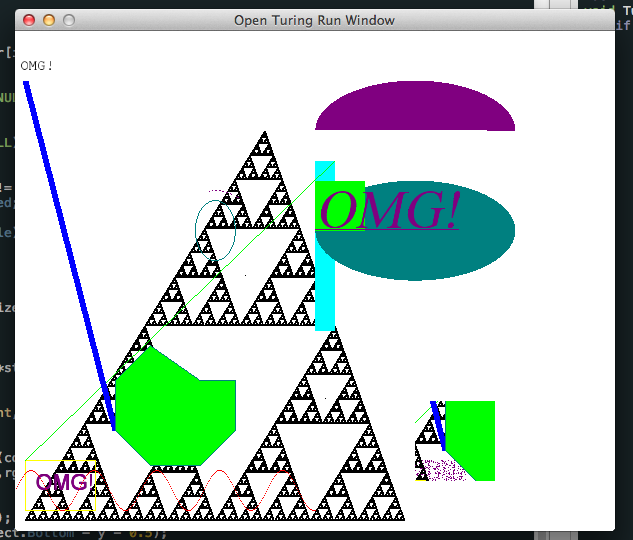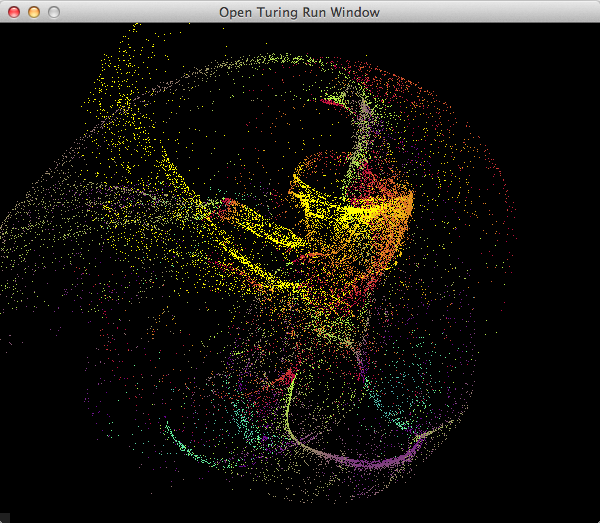OpenTuringCompiler
 OpenTuringCompiler copied to clipboard
OpenTuringCompiler copied to clipboard
A cross platform Turing Compiler built with LLVM.
#The New Open Turing Compiler - by Tristan Hume
A compiler for Turing written using LLVM for code generation and Dparser for parsing. 10x faster than the most popular implementation and cross-platform.
Unfortunately abandoned because although I have the resources to debug a compiler (with all the common features) I don't have the time to implement the thousand library methods present in regular Turing (though I made an effort and this compiler implements hundreds). The other issue is that Turing is a learning language where the possibility of compiler bugs would be devastating to the confidence of newbies, and it takes years to fully debug a compiler.
Instead see OpenTuring my fork of Turing for Windows with some minor tune-ups.
Screenshots
Test of drawing functions and computation

The Qt-based editor hooked up to the compiler

Stress-test of the OpengGL drawing and tight inner compiled loops doing 30,000 particles at 60fps

##Differences from the normal Turing interpreter
- Fast, like C kind of fast.
- Cross-platform
- Compiler not dependent on an editor.
- Code is commented C++ instead of incomprehensible C compiled from Turing
- This means it is easy to fiddle with the language, extend it, and use it
##Partial list of implemented features:
- Variables & Types
- Functions, Procedures and control structures
- Arrays and strings
- Modules
- Logic and math
- OpenGL Based Graphics
- Records
####If you want to compile it yourself you have to:
- Install the dependencies:
- dparser from http://http://dparser.sourceforge.net/
- LLVM from SVN head. It should work with regular 3.0 but I don't test it regularly http://llvm.org/
- SFML 1.6 http://www.sfml-dev.org/
- Cmake (so that you can build it)
- Build it
- Run 'cmake' and then 'make' (or figure out how to make it build a VC++ project or something)
- Check the dist folder for the "compiler" executable and then run that, passing the file to compile as a parameter
Unfortunately it's very difficult to actually assemble all the dependencies, that's C++ for you.
##Sample Program
Here is an example the compiler is capable of running:
% The 13 printing test
% As I develop the compiler I use the new features
% to print 13 in increasingly complex ways...
% test constants
const threeConst := 3
% test parsing weird constants
const testConst := -6.90460016972063023e-05
const oneConst : real := 1
% test type declarations, records and multi-dimensional arrays
type recType : record
mat : array 1..threeConst, 1..boolean of boolean
hovering : real
end record
var rec,otherRec : recType
% test alternate multi-dimensional array index syntax
rec.mat(1,2) := true
% test string length and 'var' parameters
var bob : int
proc SetBob(var bob : int)
%get bob
bob := length("123456")
end SetBob
SetBob(bob)
% test case statements and string concatenation
var prinString := "P"
proc TestCaseStat(bob : int)
case bob of
label 7,9:
prinString += "I"
label 5:
prinString += "R"
label:
prinString += "N"
end case
end TestCaseStat
TestCaseStat(5)
TestCaseStat(9)
TestCaseStat(839)
% test complex type returns
fcn RetPrintingStr () : string
result prinString + "TING "
end RetPrintingStr
var assignStr : string
assignStr := RetPrintingStr()
%test no parenthesis procedures
procedure SetHovering
rec.hovering := 0.1 * threeConst / threeConst + 0.9 * oneConst
end SetHovering
SetHovering
% test modules
module Print13
%test equality checking and code inside a module
if bob = 6 and ~(-9 > 7) & "bob" = "bob" and "lol" ~= "hi" and rec.hovering = 1 and rec.mat(1)(2) then
%test no newline
put assignStr ..
%test multi-expr
put 13,"...\n" ..
end if
% test module variables
var lolArr,lolArr2 : flexible array 1..0 of int
fcn CalcStuff(num1 : int, num2 : int) : int
result num1 - num2**2
end CalcStuff
proc PutStuff(num : int)
var bob : int := 2**num
bob := CalcStuff(bob,2)
bob div= 2
if bob > 14 then
return
end if
var ed := bob - 1
put ed
return
put 9
end PutStuff
end Print13
fcn Second( arr : array 1..* of int ) : int
result arr(2)
end Second
% test weird lower bounds
var inittedArr : array 4..7 of int := init(5,6,13,9)
for i : 1..inittedArr(6)
new Print13.lolArr, upper(Print13.lolArr) + 1
Print13.lolArr(i) := i
end for
if upper(Print13.lolArr) ~= 13 or lower(inittedArr) ~= 4 then
put "FAILED flexible arrays or array initialization"
end if
% lolArr = 1,2,3,4...
loop
Print13.lolArr(2) += 1
exit when Print13.lolArr(2) >= 4
end loop
% test implicit copy of arrays
new Print13.lolArr2, upper(Print13.lolArr)
Print13.lolArr2 := Print13.lolArr
% set bob to 5
bob := Print13.lolArr2(9) - Second(Print13.lolArr2)
% test implicit copy of records
otherRec := rec
% test passing and returning records
fcn RetAndPassRec(passRec : recType) : recType
result passRec
end RetAndPassRec
rec := RetAndPassRec(otherRec)
%check record copy and test comparison
if rec ~= otherRec then
put rec.hovering, " is not equal to ", otherRec.hovering, " after copy."
end if
if bob <= 5 or bob > 7 then
var ed := 6
Print13.PutStuff (ed) % this one returns early and never prints
Print13.PutStuff (bob)
elsif 5 >= 5 and 6 div 2 < 3 then
put 6
else
put 5 >= 4
end if